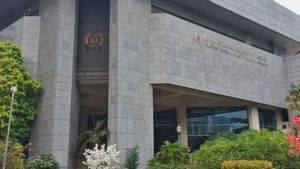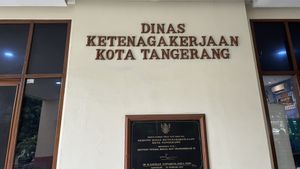JAKARTA – President Joko Widodo's leadership, which is only a matter of months away, has again been showered with criticism. This is because Jokowi, through a Government Regulation (PP), regulates the provision of contraceptives for school-age children and adolescents.
PP Number 28 of 2024 concerning the Implementing Regulations of Law Number 17 of 2923 concerning Health, which was recently issued by the government, covers several health programs including the reproductive system.

However, the PP has become a polemic because it regulates, among other things, the provision of contraceptives for school children and teenagers. Article 103 paragraph (1) of the PP states that efforts to improve the reproductive health of school-age and adolescents must at least include providing communication, information, and education, as well as reproductive health services. What has become a polemic is seen in Paragraph (4) point "e", namely the provision of contraceptives.
Contraceptives can indeed protect oneself from various risks due to sexual intercourse. But this regulation can be interpreted as approval of extramarital relations or even free sex.
Potentially Misinterpreted
Regarding the use of condoms or other contraceptives for school-age and adolescents, it has become a topic of discussion among netizens. The responses are varied.
The public is mostly against this regulation, because it is not in accordance with religious norms that prohibit sex outside of marriage. But there are also those who consider the provision of contraceptives to have a positive purpose, namely to avoid unwanted pregnancies and prevent sexually transmitted diseases.
Those who are against the provision of contraceptives for school-age and adolescents are represented by Netty Prasetiyani, a member of the House of Representatives (DPR) in Commission XI which oversees health and population.
Netty said that the PP signed on July 27 could give rise to the assumption that sexual relations are permissible for school-age children and adolescents.

"It's strange that school-age children and teenagers want to be provided with contraceptives. Is it intended to facilitate sexual relations outside of marriage?" said the member of the Prosperous Justice Party on Sunday (04/08).
Netty also highlighted the sentence "healthy, safe, and responsible sexual behavior" in school-age children and teenagers in the Health PP.
According to her, the government owes an explanation about the intent and purpose of the sentence, because it could be interpreted as allowing sex before marriage as long as it is done responsibly.
"There must be clarity about education about sexual relations which cannot be separated from the religious and cultural values adopted by the nation," Netty emphasized.
Adultery Increasing
Some time ago, the National Population and Family Planning Agency (BKKBN) said that more and more young Indonesians are delaying marriage. BKKBN Head Hasto Wardoyo said that the marriage rate had decreased significantly in 2023, reaching a record low in the last decade with only 1.58 million marriages. Compare that to 2013, when the marriage rate reached 2.21 million.
Based on the performance report of the BKKBN Family Welfare and Family Development Deputy (KSPK), the median age of first marriage for women also declined in the period from 2020 to 2023. Some women chose to marry for the first time at the age of 22.3 years in 2023, whereas over the past three years the average age of marriage for women was 20-21 years.
But on the other hand, BKKBN also highlighted that the average age of first sex for adolescents aged 15-19 years has actually increased. The percentage of women aged 15-19 who have had sexual intercourse is recorded at 59 percent, while men are 74 percent.
"So we can see, the average age of marriage is 22 years, but sexual intercourse is 15-19 years, so our adultery is increasing, this is homework for all of us, because if there is not much knowledge it can be dangerous, if you marry too young, the risk of cervical cancer is high," said Hasto last March.

Regarding the provision of contraceptives that are currently being widely discussed, Hasto emphasized that his party has so far only targeted married couples or those referred to by the BKKBN as fertile couples.
Meanwhile, for school age and adolescents, what has been done so far is providing education about sex and reproductive health, not providing contraceptives.
"(Education means) not teaching about sexual relations [but] how to care for and protect reproductive health for men and women," said Hasto.
He did not deny that the provision of contraceptives is to avoid unwanted pregnancies in extramarital sexual relations. However, Hasto also continued to emphasize the need to remember religious norms in Indonesia.
"That is the logic, but it is a logic that is still very pure in the sense that it is not in accordance with religious principles," he said.
Indonesia is a country that adheres to Eastern culture and upholds religious norms. It is natural that the emergence of PP that regulates the provision of contraceptives for school age and adolescents is considered as a form of legalizing free sex, especially among adolescents.
In fact, if the goal is an effort to improve reproductive health, then the method that should be prioritized is to no longer be taboo to discuss sex and reproductive health issues from an early age, not to encourage the use of contraceptives.
The English, Chinese, Japanese, Arabic, and French versions are automatically generated by the AI. So there may still be inaccuracies in translating, please always see Indonesian as our main language. (system supported by DigitalSiber.id)









